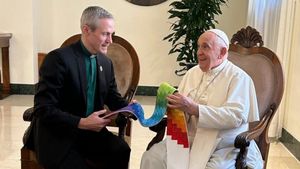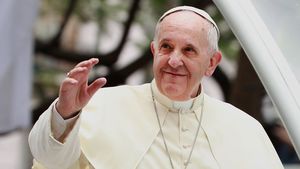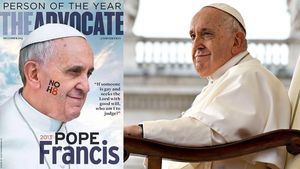During an eight-minute version of their song “The Code” — a queer anthem that won Nemo the Eurovision title earlier this year — the Swiss singer channeled Freddie Mercury, alternately singing, rapping, and performing opera in an astonishing medley of genres. The packed crowd at the Zurich Pride Festival — one enthusiastic fan was adorned in fish plushies from the film Finding Nemo — went wild for their native child, dancing and chanting their name throughout the set.
The excitement crackled in the air, and with good reason. “The world thinks of Switzerland as a little conservative,” a bartender explained after the performance. “Nemo shows that we’re here and queer too.”
Indeed, Nemo made history at this year’s Eurovision Song Contest by becoming the first out nonbinary winner of the long-running music competition, which helped put stars like Abba and Céline Dion on the map. The win also marked a milestone for Switzerland, as the last champion to represent the country was Dion in 1988. (There is no rule that a competitor representing a country needs to be a citizen.)
Zurich Pride was Nemo’s first performance in Switzerland since Eurovision aired in May. Returning to this stage was “very special and very meaningful to me,” they explain prior to their act. “You really feel the energy when you look into the crowd. It kind of feels like being at home.”
The gravity of their accomplishment in one of the world’s most-viewed non-sporting events — 163 million viewers around the world watched this year — is not lost on the out artist. “It just feels like it’s bigger than me,” says Nemo, who from talking with people on the street has come to understand how much they have moved the needle on LGBTQ+ issues in their motherland. “This [win] really had an impact…on the whole understanding of the country of nonbinary people in general,” they attest. “And I think that is such an honor.”
 MARTIN SYLVEST ANDERSEN/GETTY IMAGES
MARTIN SYLVEST ANDERSEN/GETTY IMAGES
However, Nemo is keen to keep “a healthy distance” between the perception of who they are and the community they represent. There is a difference between “what you are as a person and then kind of what people project onto you,” they note. “And it can be a bit scary to be like the whole image of this movement here, because it’s so much more than me. And I think it’s important to remember that. But it’s just a big honor that so much has happened since and that people maybe [have] gotten a bit a bit better at listening and trying to understand.”
Nemo, now 24, hails from Biel, a city in the Bern region where both German and French are spoken. In Biel, they first fostered their love of music, joining the youth opera at the city theater at age nine and performing Mozart’s The Magic Flute the following year. Later, as a young adult, they say they went to Berlin to immerse themselves in queer culture.
Today, Nemo is thrilled to find community in their home country as well. “I’m getting to know so many more queer places as I’m returning back to Switzerland, and they present themselves in a different way to me now,” says Nemo, who first came out as nonbinary in a Swiss outlet in November 2023.
Nemo brought their opera skills (and queerness) to the main stage at Eurovision. Haven’t seen it? Google their performance, or watch the program in its entirety on the Peacock streaming service. It’s truly an Olympic set where Nemo, in a pink skirt and fluffy coat, balances on the edge of a large spinning disc while singing “The Code.”
Nemo describes their music as “a very theatrical experience. Like the song that I released through Eurovision, I always explain it as almost like a three-minute theater piece that tells basically the story of just a realization that I’m nonbinary and coming to terms with it, accepting myself, and finding joy through it, and coming to a place where I just feel comfortable with myself, and I feel proud with who I am.”
The largest reward from this experience has been “realizing that so many people really related to it, or so many people have found kind of a safe space in it. And that’s really what I want to continue to create.” Off the stage, Nemo has sought to carve a safe space in the political world by lobbying Switzerland to legally recognize a third gender.
As for their iconic Eurovision jacket, a winner in its own right, Nemo stumbled into it just days before the contest; it was waiting on a hangar in the middle of a store called Pampas in Malmö, Sweden, where Eurovision was staged this year. Staring at themselves in the mirror, they immediately “felt a connection, like there was some sort of like vulnerability but also like an elegance in it that I really liked.”
It also checked Nemo’s boxes for fashion. “I think I just really try to wear something that I feel comfortable in, and something that I feel beautiful in…. It’s always about what feels right to you,” says Nemo, who at the time of this interview was wearing a giant fuzzy pink hat reminiscent of Where the Wild Things Are, paired with a rainbow jersey, a pleated blue skirt, and sneakers.
In the coming months, Nemo will tour Europe. Recently signed by Island Records, a label owned by Universal Music Group, they also dream of collaborating with Chappell Roan and Doja Cat on opera and/or rap. And there’s also next year’s Eurovision to plan.
As per tradition, the Eurovision winner’s country typically hosts the contest the following year. Nemo is unsure Biel could handle the crowds, which have surged as large as 38,000 attendees for past events. But in a volatile world — protests tied to the Gaza-Israel conflict added some controversy to 2024’s proceedings — Nemo sees an international event where cultures come together as vital.
“I think we need events like that more than ever, but we also need to be very intentional with what they should stand for,” they say. “I think that we live in a time where it’s really important to find ways to find…each other as human beings. And as I said before, like, listen to each other. And I think Eurovision has great potential to do so. And I hope that Switzerland, and the organizers, and the E.B.U. [European Broadcasting Union] find a way to just like really keep the core values of Eurovision and make it an event that just brings people together.”
This article is part of the Out September/October issue, which hits newsstands on August 28. Support queer media and subscribe— or download the issue through Apple News, Zinio, Nook, or PressReader starting August 13.
 SWITZERLAND TOURISM
SWITZERLAND TOURISM




 MARTIN SYLVEST ANDERSEN/GETTY IMAGES
MARTIN SYLVEST ANDERSEN/GETTY IMAGES SWITZERLAND TOURISM
SWITZERLAND TOURISM
















































































